Aug
18
2009
How were the gentiles related to Passover?
By watching it, and putting faith in it.
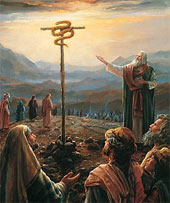 In order for a stranger to eat Passover, he had to circumcise himself and his household (Ex. 12:45-49). If he did so, he became “like a native of the land” (v. 48). We are so accustomed to connecting Passover with the Lord’s Supper that it seems strange to consider that perhaps Passover was only for the priestly people, but such was the case. Converted gentiles were not to eat of it unless they were circumcised, and thereby were incorporated into the seed line of Abraham. Did this exclude them from salvation? No, it only excluded them from priestly duties. Did it make them second class citizens? Only in the eyes of the Pharisees. Biblically speaking, their downstream cultural labors in Havilah were just as important as Israel’s sanctuary task. After all, if everyone had become an Israelite, then who would mine the gold of Havilah? Who would bring it to the sanctuary? Israel had its task, and the converted nations had theirs.
In order for a stranger to eat Passover, he had to circumcise himself and his household (Ex. 12:45-49). If he did so, he became “like a native of the land” (v. 48). We are so accustomed to connecting Passover with the Lord’s Supper that it seems strange to consider that perhaps Passover was only for the priestly people, but such was the case. Converted gentiles were not to eat of it unless they were circumcised, and thereby were incorporated into the seed line of Abraham. Did this exclude them from salvation? No, it only excluded them from priestly duties. Did it make them second class citizens? Only in the eyes of the Pharisees. Biblically speaking, their downstream cultural labors in Havilah were just as important as Israel’s sanctuary task. After all, if everyone had become an Israelite, then who would mine the gold of Havilah? Who would bring it to the sanctuary? Israel had its task, and the converted nations had theirs.
Continue reading
2 comments | tags: Abraham, Circumcision, James Jordan, Passover, Pharisees | posted in Biblical Theology, Quotes
Aug
11
2009
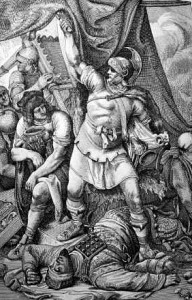
There’s a great deal of confusion concerning the place of modern Jews in God’s economy. This stems from a misunderstanding of what occurred in the first century, which is difficult to interpret if we ignore previous occurrences of the same pattern. Dispensationalists cherrypick Old Testament verses and rip them out of their historical contexts to maintain that there is a separate plan for the Jews. But even many Conservatives who understand rightly that the Old Covenant is in fact over, believe that God is still joining Jew and Gentile into one body.
Titus steps over the High Priest into the Most Holy Place.
Continue reading
Comments Off | tags: Abraham, James Jordan, oikoumene | posted in Biblical Theology, Quotes, The Last Days
Jul
21
2009

“I gave the sermon on Hagar and Ishmael today… I began my remarks by pointing out the similarity between the stories of Hagar and Ishmael sent off into the wilderness and Abraham going off with Isaac to sacrifice him, as he believes. My point was that Abraham is in effect called upon to sacrifice both his sons, and that the Lord in both instances sends angels to intervene at the critical moment to save the child. Abraham’s extreme old age is an important element in both stories, not only because he can hardly hope for more children, not only because the children of old age are unspeakably precious, but also, I think, because any father, particularly an old father, must finally give his child up to the wilderness and trust to the providence of God. It seems almost a cruelty for one generation to beget another when parents can secure so little for their children, so little safety, even in the best circumstances. Great faith is required to give the child up, trusting God to honour the parents’ love for him by assuring that there will indeed be angels in that wilderness.
I noted that Abraham himself had been sent into the wilderness, told to leave his father’s house also, that this was the narrative of all generations, and that it is only by the grace of God that we are made instruments of His providence and participants in a fatherhood that is always ultimately His.”
Reverend John Ames, in Gilead by Marilynne Robinson, p. 128-129.
Comments Off | tags: Abraham, Marilynne Robinson, Parenting | posted in Christian Life, Quotes
Jul
14
2009
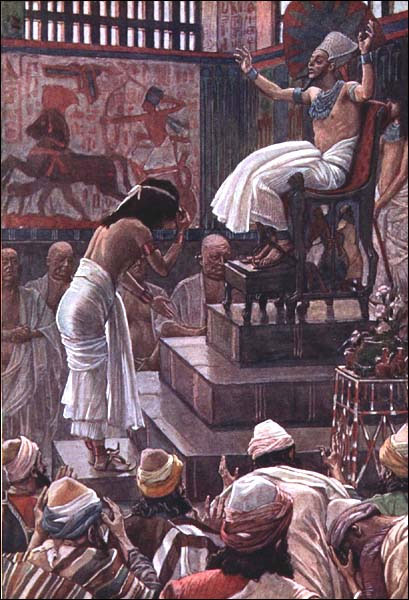
or Theonomy in the Bible
“…instead of Moses and Aaron challenging the powers that be, we have Herodian preachers crying “Peace, peace” when there is no peace. Nathan is not qualified to confront David because Nathan himself has been sleeping around.”
In his post Christianity as Comprehensive Cultural Tribunal?, timsmartt questions the validity of philosophy’s self-appointed role as an unbiased cultural referee and wonders whether Christianity should take that role:
Continue reading
Comments Off | tags: Aaron, Abraham, Against Hyperpreterism, antichrist, Daniel, Esther, Herod, Jethro, John the Baptist, Korah, Melchizedek, Mordecai, Moses, Nathan, Philosophy, Postmillennialism, Solomon | posted in Biblical Theology, The Last Days, The Restoration Era
Jun
27
2009
or Silencing the Higher Critics

Yet more on literary analysis of the Bible as a ‘terrible marvel‘; a review of two books. As Warren Gage has commented, we are on the verge of a tremendously creative time in Biblical theology. But this to me seems also to be an element of scholarship returning home, older and wiser, from a wilderness of unbelief.
Genesis: The Story We Haven’t Heard
by Paul Borgman. Downers Grove, IL: Intervarsity Press, 2001. 252 pages.
The Literary Structure of the Old Testament: A Commentary on Genesis-Malachi
by David A. Dorsey. Grand Rapids, MI: Baker Books, 1999. 330 pages.
Reviewed by Timothy Paul Erdel, Ph.D., Archivist and Assistant Professor of Religion and Philosophy, Bethel College, Mishawaka, IN.
“I have been fascinated by the primal power of Old Testament stories for as long as I can remember. From my perspective, there is no clearer window on human character, no greater storehouse of hard and holy truths. Yet some tales are deeply disturbing. Phyllis Trible calls them ‘texts of terror.’ Even the most familiar passages may seem strangely distant. So I relish each time a preacher or teacher sheds new light on these ancient Hebrew narratives.
Continue reading
Comments Off | tags: Abraham, Babel, C. S. Lewis, Chiasm, Compromise, David A. Dorsey, Higher Criticism, Isaiah, Jeremiah, Literary Structure, Warren Gage | posted in Biblical Theology, Quotes
May
11
2009
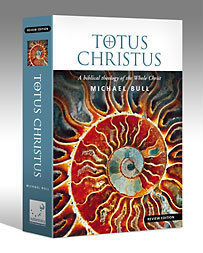
Abraham had gone to extreme measures to make sure Isaac didn’t intermarry with Canaan and pollute the promise. He sent his most faithful servant as a forerunner to find a bride for his son. Like John the Forerunner, the most faithful servant found the beautiful bride, Rebekah, by the water in a garden of God. And like Paul the apostle, the servant adorned her with gold in preparation for her presentation to the Bridegroom. Like Herod and the Jews, Laban and his mother didn’t want to let her go, and were given no choice but to bless her with their riches.
Comments Off | tags: Abraham, Ecclesiology, Herod, Isaac, John the Baptist, Laban, Paul | posted in Biblical Theology, The Last Days, Totus Christus
Apr
13
2009
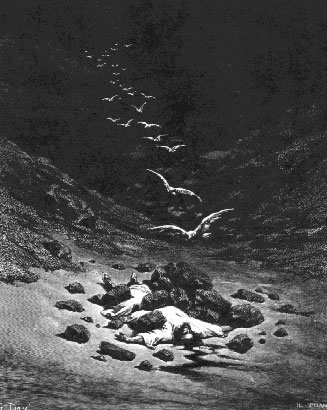
“And all Israel stoned [Achan and his family] with stones, and burned them with fire, after they had stoned them with stones.”
Questions from blogger Blue Ollie:
Many still claim to get their morals from the Bible. Well, what does the Bible actually say?
The following is a very incomplete list but is nevertheless a valid list.
1. How do you determine if someone is guilty? Answer: gamble.
Continue reading
1 comment | tags: Abraham, Achan, Atheism, Joshua, Justice, Lot, Sodom, Urim and Thummim | posted in Apologetics, Biblical Theology, Ethics
Apr
10
2009
or An answer for those who think modern day Israel has any special place in Bible prophecy.
After the scattering at Babel, the Lord tore the world in two by calling Abram. With the end of this large Division, signified by circumcision, there was no more distinction between the priest nation and the Gentiles. James Jordan writes:
Continue reading
Comments Off | tags: Abraham, Babel, Bible history, Dispensationalism, James Jordan | posted in Biblical Theology, The Last Days, The Restoration Era, Totus Christus
Apr
10
2009
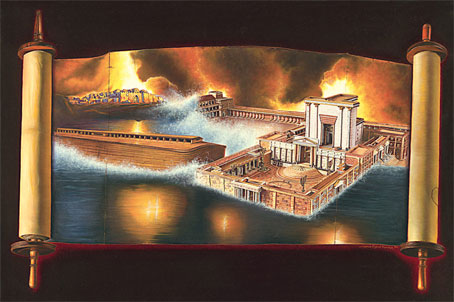
A couple of guys have written a book called Beyond Creation Science. As preterists, they understand there was a symbolic ‘flood’ across the Land of Israel under both Nebuchadnezzar’s Babylon and Nero/Vespasian’s Rome. Problem is, they read this back into Noah’s flood and try to say that this was only a local flood, which then allows them to compromise with old-earth Creationism.
It was ‘long-age’ geological assumptions that provided a ‘foundation’ for Darwin’s long-age biological fantasy. I would recommend Tas Walker’s site, Biblical Geology, for someone who really knows his stuff.
The position of these fellows causes more problems than it fixes. It makes the Bible’s very detailed chronology a joke, and forces a gap of millions of years into Genesis 1.
Here’s the solution:
Adam’s failure brought physical de-Creation. Cain founded a corrupt civilisation whose evil influence triumphed and was destroyed in a literal flood. Just like Cain, Ham was cursed, and his son Canaan’s influence led to social de-Creation. As God raised new land out of the waters after the flood, God would now perform another Creation miracle. In calling Abram, God was socially dividing the waters of the nations into the Land and the Sea. The era of the patriarchs, ruling fathers, began. God called Abram, and tore the world in two.
The land and sea division was a literal, physical land and sea in early Genesis. The ark of Noah was a literal ’world-in-a-box’, a safehouse and doorway to a new world. But when God called Abram, the ‘Land and Sea’ division was purely social, and the Tabernacle and Temple were a symbolic ‘world-in-a-box.’ These guys have confused these two and unwittingly undermined the authority of Scripture.
[Also, on hyperpreterist ‘Covenant Creationism’, see A Chronic Hysteresis.]
Comments Off | tags: Abraham, Against Hyperpreterism, Bible Chronology, Covenant Creationism, Temple, The flood | posted in Against Hyperpreterism, Biblical Theology, Creation, The Last Days
Apr
10
2009
Do the words ‘Love, joy, peace, patience, kindness, self-control’ make you think of old ladies, tea cups, embroidered Bible bookmarks and homemade jam?

Perhaps if we looked to the Old Testament for examples of godliness instead of 19th century pietism we men would do better and so would our churches.
Think of Abraham’s kindness as he plunders the kings of the plain to rescue his nephew! His self-control as he refuses the riches of Egypt and Sodom! Solomon’s national peace after the destruction of his father’s enemies! His throwing of loud, generous and very alcoholic parties to express his joy! Because of their great love, Paul risking his life to stand and preach publicly, and Jesus using cutting words to tell off the Jews for their neglect of mercy and justice. And of course, the very masculine patience of Job in the face of continuous accusations.
These might seem a bit offbeat, but it would sure help us to think more this way. If these don’t sound very Christian you should read your Bible instead of your embroidered bookmark. Otherwise, go ahead and join the Women’s Guild.
I guess it boils down to active versus passive godliness.
Comments Off | tags: Abraham, Job, Masculinity, Paul, Solomon | posted in Christian Life
In order for a stranger to eat Passover, he had to circumcise himself and his household (Ex. 12:45-49). If he did so, he became “like a native of the land” (v. 48). We are so accustomed to connecting Passover with the Lord’s Supper that it seems strange to consider that perhaps Passover was only for the priestly people, but such was the case. Converted gentiles were not to eat of it unless they were circumcised, and thereby were incorporated into the seed line of Abraham. Did this exclude them from salvation? No, it only excluded them from priestly duties. Did it make them second class citizens? Only in the eyes of the Pharisees. Biblically speaking, their downstream cultural labors in Havilah were just as important as Israel’s sanctuary task. After all, if everyone had become an Israelite, then who would mine the gold of Havilah? Who would bring it to the sanctuary? Israel had its task, and the converted nations had theirs.

































